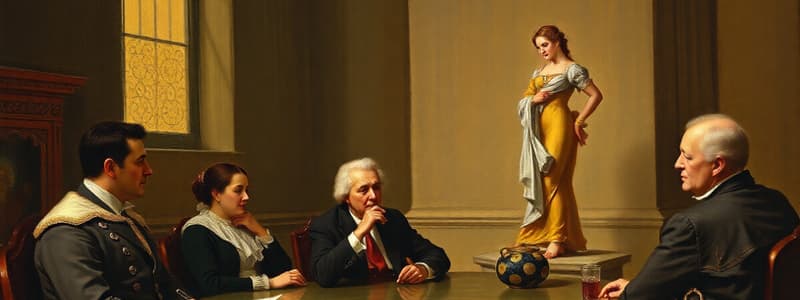Podcast
Questions and Answers
What is the primary role of the Prime Minister in a parliamentary system?
What is the primary role of the Prime Minister in a parliamentary system?
- To serve as the head of state
- To represent the country in international trade agreements
- To execute government policies and preside over cabinet meetings (correct)
- To oversee the judicial branch of government
Which of the following is NOT a responsibility of the Prime Minister?
Which of the following is NOT a responsibility of the Prime Minister?
- Directly overseeing the judiciary (correct)
- Appointing other ministers
- Leading the executive branch
- Setting the national policies and plans
How can a Prime Minister lose their position in a parliamentary system?
How can a Prime Minister lose their position in a parliamentary system?
- By a popular vote from the general public
- By failing to maintain majority support in parliament (correct)
- By not attending cabinet meetings regularly
- By an impeachment process initiated by the judiciary
What is a key function of the Prime Minister in maintaining political unity?
What is a key function of the Prime Minister in maintaining political unity?
In what ways does the Prime Minister represent the country internationally?
In what ways does the Prime Minister represent the country internationally?
Which statement about the selection process of a Prime Minister is true?
Which statement about the selection process of a Prime Minister is true?
What typically influences the Prime Minister's authority and influence?
What typically influences the Prime Minister's authority and influence?
With which branch of government is the Prime Minister primarily accountable?
With which branch of government is the Prime Minister primarily accountable?
Flashcards
Prime Minister (PM)
Prime Minister (PM)
The head of government in a parliamentary system, often the most powerful political office in the nation. They preside over cabinet meetings, set the national agenda, and execute government policies.
Key Responsibilities of a Prime Minister
Key Responsibilities of a Prime Minister
Appointing ministers, leading the executive branch, setting national policies, representing the nation internationally, and maintaining political unity within the ruling party.
Leading the Executive
Leading the Executive
Directly responsible for executing government policies and supervising the work of the cabinet and government departments.
Legislative Agenda Setting
Legislative Agenda Setting
Signup and view all the flashcards
Maintaining Political Unity
Maintaining Political Unity
Signup and view all the flashcards
Accountability to Parliament
Accountability to Parliament
Signup and view all the flashcards
Subservience to the Law
Subservience to the Law
Signup and view all the flashcards
Prime Minister Selection Process
Prime Minister Selection Process
Signup and view all the flashcards
Study Notes
Overview of the Prime Minister
- The Prime Minister (PM) is the head of government in a parliamentary system.
- This role is usually the most powerful political office in the nation.
- The PM typically presides over cabinet meetings, sets the national agenda, and is responsible for executing government policies.
- The PM's influence and authority vary across different countries and systems.
Powers and Responsibilities
- Appoints other ministers.
- Leads the executive branch.
- Sets the national policies and plans.
- Shapes the political agenda.
- Represents the country internationally.
- Often commands a significant political role within parliament.
- Responsible for the government's performance and actions.
- Leads the ruling coalition and party.
- Addresses and leads political campaigns.
Key Functions
- Leading the Executive: Directly responsible for executing government policies, and supervising the work of both the cabinet and other government departments.
- Legislative Agenda Setting: The prime minister's office plays a major role in which laws receive the government's attention and receive support.
- Policy Formulation: Often involved in the development and refinement of national policies for various sectors.
- Maintaining Political Unity: In a parliamentary system, the PM's success is often tied to maintaining cohesion and unity within the ruling political coalition or party.
- International Representation: The PM represents the country during talks with foreign leaders, and also speaks for the country on many global issues.
Relationship with Other Branches of Government
- Parliament: The PM is accountable to parliament. The PM can lose their position if Parliament votes no confidence.
- Judiciary: The PM is subservient to the rule of law and legal systems.
- Other Branches: The prime minister interacts with other branches of government to ensure policy aims are pursued effectively.
Selection Process
- The selection process for the Prime Minister can vary considerably by country.
- In some parliamentary systems the party with the most votes in an election usually designates a candidate for the position.
- In other systems, a vote in the parliament elects the candidate, which will result in a candidate backed by a majority.
Term of Office
- The PM's term usually correlates with the parliamentary term.
- A PM can lose their position in parliament in case a vote of no confidence is successful.
- The PM's tenure depends on maintaining their party's majority in parliament and supporting members.
Challenges Faced
- Managing diverse political coalitions and factions.
- Balancing national interests with international priorities.
- Responding to economic and social challenges.
- Maintaining public trust and confidence.
- Addressing public criticism on government policy.
Significance
- The PM plays an incredibly crucial role in any country's leadership.
- They are responsible for the general welfare and well-being of citizens.
- The political influence of the PM can dramatically affect the lives of individuals and the overall direction of the nation.
Studying That Suits You
Use AI to generate personalized quizzes and flashcards to suit your learning preferences.




